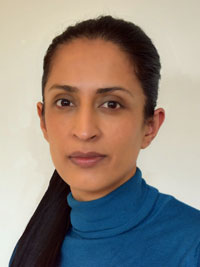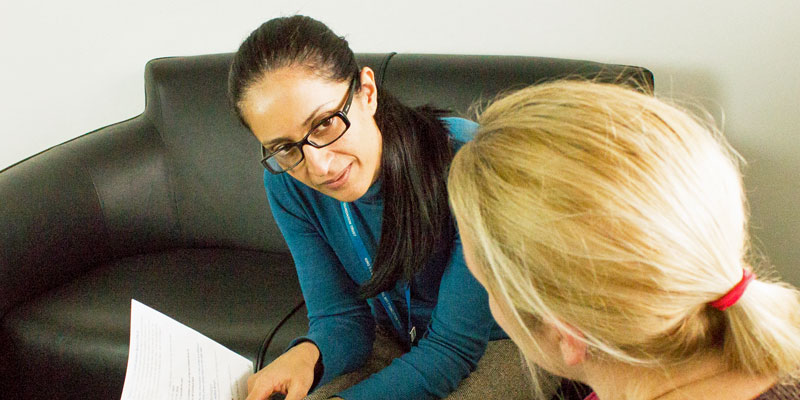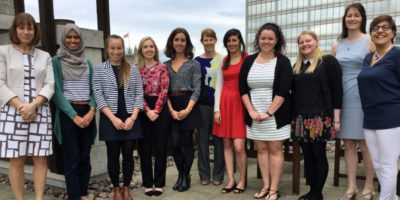Dr. Sabrina Bajwah is a consultant and honorary senior lecturer in the Department of Palliative Care, Policy & Rehabilitation at King’s College London. Having completed an M.Sc. in Palliative Care and an M.A. in the Ethics of Cancer and Palliative Care, she has recently completed her Ph.D. in complex interventions for patients with end stage interstitial lung disease, where she developed a complex intervention at the end of life for patients. Sabrina now works clinically within the Palliative Care team at King’s College NHS Foundation Trust, as well as running a palliative care respiratory clinic alongside continuing to work on respiratory palliative care research.

“…Pakistani Muslims are one of the most underrepresented ethnic minorities in STEM. I think this is due to multiple factors, but includes prejudice inside and outside the community. I think strong women who succeed should be applauded and be encouraged to act as role models / mentors for young girls…”
Improving the quality of life of patients and families experiencing life-threatening illness
I went to medical school in Manchester and it was a female palliative care consultant I was working alongside as a junior doctor who inspired me to pursue a career in palliative care. Palliative care aims to improve the quality of life of patients and families experiencing life-threatening illness. This can be through improving symptoms such as pain. However, the importance of holistic care is stressed with non-physical symptoms such as psychological distress (for both the patient and carer) also emphasised. My work can be hard as I often have to manage patients at the end of life but it is incredibly worthwhile and I wouldn’t change it for anything.
I currently work a 60:40 clinical / research split. So the majority of my week I am seeing patients either on the wards or in clinic. The rest of my week, I do research. I really enjoy the day to day patient contact but my real passion is my research. To be able to make a difference to health care for the future is incredibly exciting!
Conducting research to help patients and carers suffering in silence

Whilst working as a junior doctor, it became clear to me that patients with a certain type of respiratory disease – interstitial lung disease, have a high symptom burden and unmet palliative care needs. This motivated me to pursue research in this area. My Ph.D. formally assessed what these needs were and showed that these patient and carers were suffering in silence with access to very little palliative care support (in hospital or in the community).
During my Ph.D., I developed a complex intervention at the end of life for these patients which aimed to improve symptoms and quality of life. Following this, I worked with a Hull-based team to develop a needs assessment tool to allow hospital health professionals to identify patients and carers who needed referral to palliative care.
I have recently worked with the National Institute of Clinical Excellence to set national quality standards for the palliative care management of these patients. In addition, I act in an advisory capacity on a number of committees which include the British Thoracic Society and the British Lung Foundation.
Last year I was successful in winning a National Institute for Health Research grant to continue the work from my Ph.D. I am incredibly passionate about continuing this work as I believe more research is needed urgently to improve the symptoms and quality of life of these vulnerable patients and carers.
Gender balance in medicine – a long way to go

The majority of people that complete a Ph.D. in STEM are male. There is currently a big push through initiatives such as Athena SWAN to ensure equality for women in science research. However, I think there is still a fair way to go as the vast majority of tenured professors in the UK are male.
An important part of research is to make it translatable into every day practice. Diversity is needed to understand the perspectives of patients and carers from different backgrounds and in turn to think of ways to put that research into a real life context. In addition, different experiences and backgrounds allow you to think outside the box!
Smashing the glass ceiling AND the bamboo ceiling in STEM
I think BAME women not only have to break through the glass ceiling of being a woman, but also the “bamboo ceiling” of ethnicity. I am a British Pakistani Muslim and in the current political climate, I worry that my two young daughters will also have to manage potential prejudices about being Muslim.
Pakistani Muslims are one of the most underrepresented ethnic minorities in STEM. I think this is due to multiple factors, but includes prejudice inside and outside the community. I think strong women who succeed should be applauded and be encouraged to act as role models / mentors for young girls.
Don’t ever let anyone tell you that you shouldn’t have ambition
I would strongly encourage you to pursue a career in medicine. I am the daughter of working class immigrants and my first language when I started school was Urdu. However, I was lucky to have incredibly supportive parents who stressed the importance of education and have supported me every step of the way. Believe in yourself and find someone that believes in you to support you. Look at strong women who succeed and you will realise you can do that too. Don’t ever let anyone tell you that you shouldn’t have ambition.
Celebrating diversity and growing ambitions
I’m really lucky that I work in a department where I am valued and my diversity celebrated. I have always been incredibly ambitious and that only seems to be increasing as I get older! I’m really enjoying my research and clinical work at the moment but will look to move more into research in the next few years. Ideally, I would like to move up the academic ladder and eventually become a tenured professor. I’m not aware of any tenured STEM professors in the UK who are Pakistani women, so we will have to see!
http://www.kcl.ac.uk/lsm/research/divisions/cicelysaunders/about/people/honorary/bajwahs.aspx
https://twitter.com/kingscollegenhs
https://twitter.com/kingsmedicine
https://www.facebook.com/kingscollegelondon
Image credit for micrograph of interstitial pneumonia: By No machine-readable author provided. KGH assumed (based on copyright claims). [GFDL (http://www.gnu.org/copyleft/fdl.html) or CC-BY-SA-3.0 (http://creativecommons.org/licenses/by-sa/3.0/)], via Wikimedia Commons





